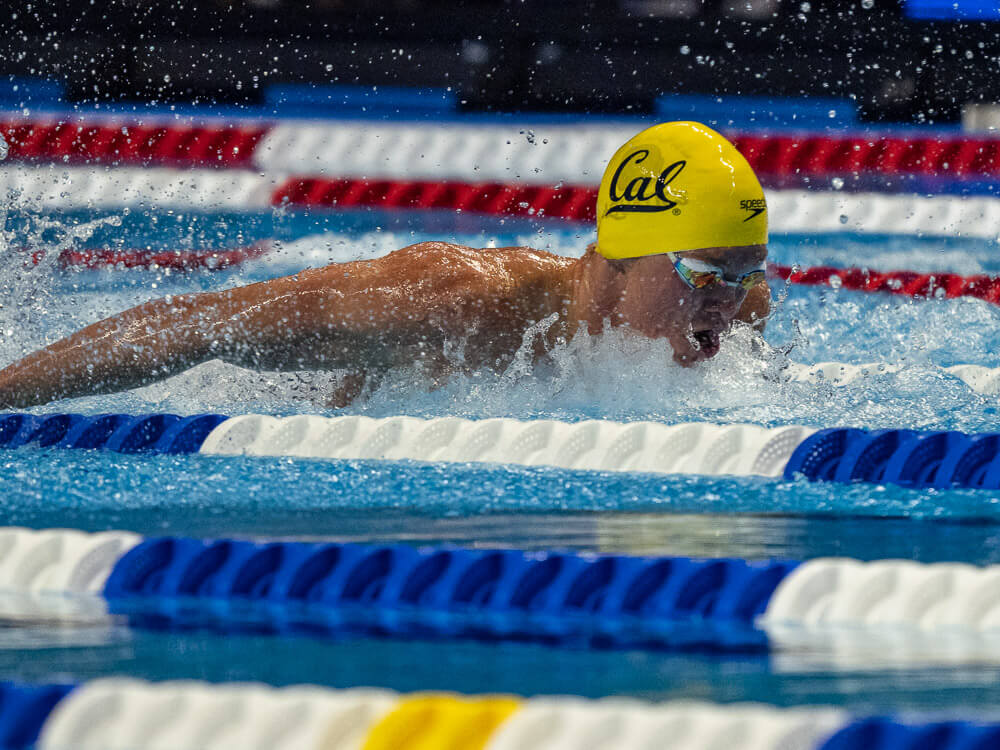Speedo Summer Championships: Trenton Julian Posts USA’s Top 200 Fly Time in 2021 in Irvine

Speedo Summer Championships: Trenton Julian Posts USA’s Top 200 Fly Time in 2021 in Irvine
During the first evening of finals at the Speedo Summer Championships meet in Irvine, Calif., Cal’s Trenton Julian recorded the fastest time in the United States in 2021 in the men’s 200 butterfly. Julian, who was fifth at Olympic Trials in June in the 200 fly after swimming a 1:55.35 in the semifinals, dropped six tenths from his lifetime best on his way to a 1:54.71. That swim moved Julian from 19th in the world rankings to seventh, and he moved ahead of Zach Harting’s 1:54.92 from the Olympic Games as the top performance by an American this year.
At Trials, Julian was first through 150 meters before fading badly on the last length in both semifinals and finals, swimming above 32 seconds on both occasions. But this time, Julian kept it together enough to break 1:55 for the first time. He was simply more relaxed through the first 150 meters before turning in around the same time at 150 meters. Then, his last split was three-quarters of a second quicker.
Olympic Trials splits: 25.11, 53.65 (28.54), 1:23.25 (29.60), 1:55.35 (32.10)
Irvine splits: 25.41, 53.85 (28.44), 1:23.26 (29.51), 1:54.71 (31.35)
The only U.S. swimmer to qualify for the 200 fly final at the Tokyo Olympics was Gunnar Bentz, who finished seventh. Julian’s swim from Irvine would have been quick enough for fifth.
Julian had never broken 1:57 in the long course 200 fly before May, when he swam a 1:55.77 at the Atlanta Classic to establish himself as a prime contender for the event at Olympic Trials. Julian also had an impressive NCAA championships in what he assumed was his final year at Cal, finishing second in the 200 fly, third in the 200 free and fourth in the 500 free, but Julian announced in July that he will return to Cal for a fifth year of competition, which was allowed because of the COVID-19 pandemic.
In other events, Longhorn’s David Johnston swam a 15:16.07 in the men’s 1500 free. Johnston finished seventh in the mile at Olympic Trials, and he improved on his 15:18.61 from June with his 15:16.07 in Irvine. Johnston was the third Trials finalist to improve his Omaha time during the Speedo Summer Championships, joining Charlie Clark and Will Gallant at the Greensboro meet. The second and third-place finishers in the race dropped massive amounts of time, with Tsunamii Swim Team’s Alec Enyeart taking second in 15:22.66, dropping almost 30 seconds, and Minnesota’s Chris Nagy grabbing third in 15:32.52, more than 13 seconds under his previous best.
Meanwhile, in the women’s version of the 200 fly, Olympic Trials finalist Justina Jozan of Mission Viejo picked up a comforable win in 2:10.21. Rancho San Dieguito’s Mia Kragh actually held a significant lead at the final turn but faded badly as Kozan out-split her by more than two seconds on the last 50. Kragh would end up second in 2:11.65, and well back in third was Minnesota’s Megan Van Berkom in 2:13.93.
14-year-old Teagan O’Dell captured first in the 100 free in 55.82, edging the University of Denver’s Anna Shaw after overcoming Shaw’s half-second lead at the halfway point. Irvine Novaquatics’ Ella Ristic took third in 56.40. In the men’s 100 free, Irvine Novaquatics’ Jesse Novak held off Cal’s Destin Lasco, 49.46 to 49.50, while Luke Maurer claimed third in 49.82.
Austin Swim Club’s Jillian Cox won the women’s 800 free in 8:42.11, while Iowa Flyers’ Aurora Roghair dropped 10 seconds to take second in 8:45.10. Tritons’ Juli Arzave claimed third in 8:48.79.
Irvine Novaquatics completed the evening with a win in the men’s 400 free relay. Christian Quintero (50.24), Jesse Novak (50.01), Christopher Mykkanen (49.17) and Leif-Henning Kluever (50.19) combined to swim a 3:19.61.
The Speedo Summer Championships includes two meets taking place on opposite sides of the country. Half the swimmers are in Greensboro, N.C., while the other half are in Irvine, Calif. The meet replaces the standard end-of-summer championships for senior-level and junior-level athletes, with the two usual events combined due to typical low turnout when the meets are around the same time as the Olympic Games. Older swimmers and 18-and-under swimmers had different time standards required for qualification. Most of the top American swimmers either just finished competing at the Olympics or are taking the summer off after narrowly missing the Olympic team.



